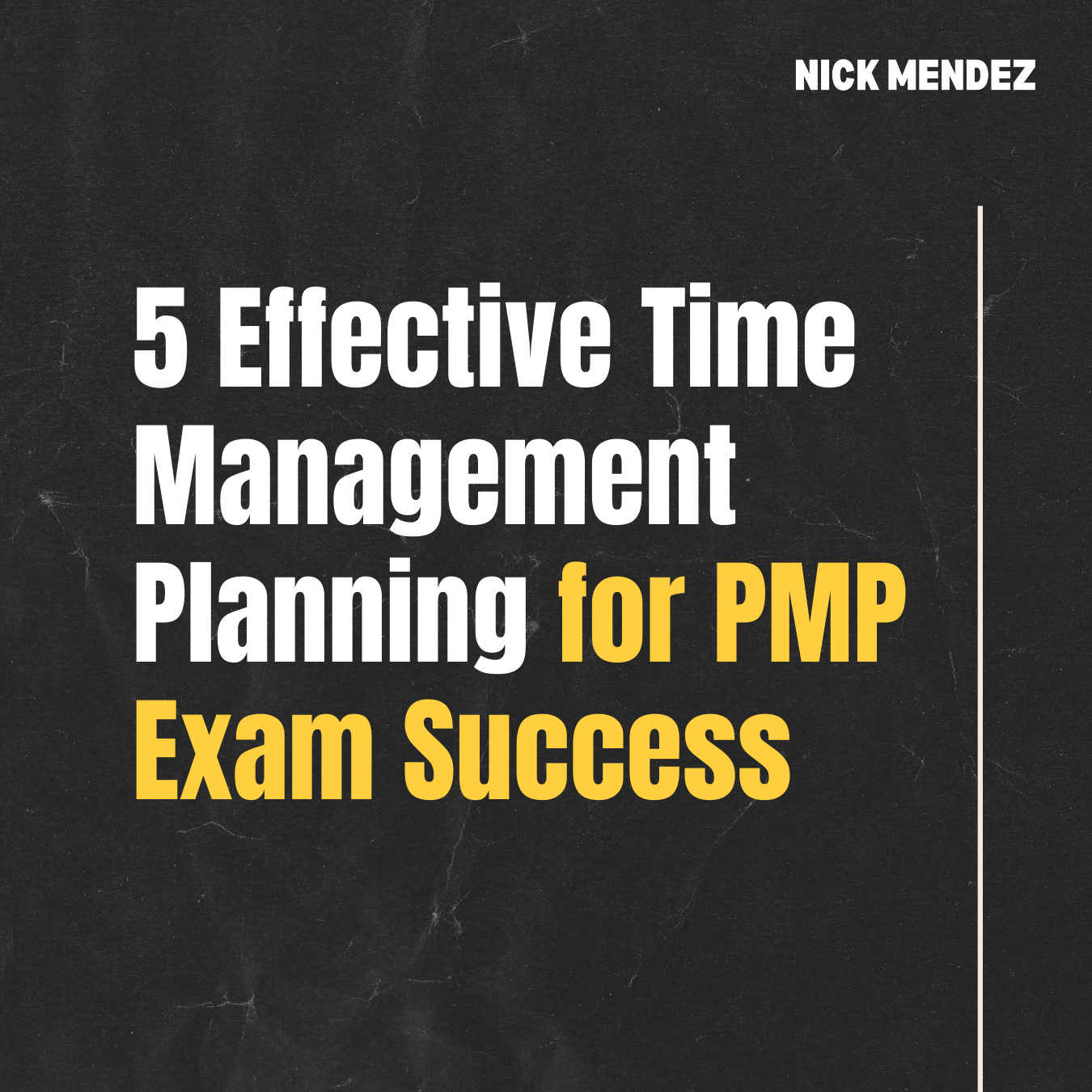5 Effective Time Management Planning for PMP Exam Success
Table of Contents

About the Author – About Nicholas Mendez (Nick Mendez):
Nicholas Mendez (Nick Mendez) is a 25-year-old tech professional with 5+ years of project management experience. He earned his PMP certification on April 30, 2023, marking a significant milestone in his career. Since then, he’s written many guest posts and blog posts where readers have received a great amount of value and knowledge to prepare for their PMP exam. Check out his FREE exclusive top-notch PMP study resources at teachmeit.co and nickmendez.co and get ready to take your career to the next level!

Have you ever spent much of your valuable time management planning a project, only to realize that time slipped away faster than expected? The journey to earn the highly-desired Project Management Professional (PMP) Certification may feel similar. It involves grappling with complex concepts, intense study sessions, and the looming challenge of exam day. Despite these challenges, effective time management becomes a crucial key that can impact success or failure significantly.
After months of dedicated study, the pressure intensifies as you finally approach the PMP exam. Yet, regardless of your proficiency in project management, the real challenge lies in effectively managing your time during the test. Without proper time management, even the most skilled project managers may struggle to go through the questions and scenarios within the allotted time, putting their success at risk despite their expertise.
1) Set Up a Study Timetable for Time Management Planning
To prepare effectively for the PMP exam, it’s essential to develop a study timetable. Begin by evaluating your weekly commitments to determine the time you can dedicate to studying. Consider your work hours, family responsibilities, and other obligations to create a realistic schedule.
Next, break down the extensive PMP exam syllabus into smaller, manageable portions. Divide the study material into sections or chapters to facilitate focused study sessions and ensure adequate time for each topic. Breaking the material into manageable sections helps prevent overwhelm and promotes thorough comprehension. Additionally, establish clear goals for your study schedule. Determine when you aim to complete each study section or chapter, setting deadlines to maintain accountability and motivation throughout your exam preparation journey.
2) Gain Proficiency in the Exam Framework and Domains
To succeed in the PMP exam, grasping its structure and domains is essential. Begin by familiarizing yourself with the exam’s content, covering project initiation, planning, execution, monitoring and controlling, and closing. Each domain corresponds to specific tasks and knowledge areas outlined in the Project Management Body of Knowledge (PMBOK) Guide.
Understanding the time constraints is equally essential: the exam comprises 180 multiple-choice questions to be completed within 230 minutes, allowing roughly 1.27 minutes per question. Being mindful of this time allocation per question aids in effective pacing during the exam.
Strategic time management across various sections is paramount for success. The Project Management Institute (PMI) defines eight project performance domains crucial for successful project outcomes: stakeholders, team, development approach and life cycle, planning, project work, delivery, measurement, and uncertainty. Each domain entails a critical aspect of project management that contributes to project success. Mastering these domains is vital for effective project management and PMP exam preparation. By thoroughly understanding the nuances of each domain, you can build a strong foundation in project management principles and enhance your ability to apply them in real-world scenarios.
3) Organize and Distribute Tasks
While delegation can significantly enhance study efforts, solo candidates face unique challenges without access to study groups or collaborative peers. For those studying alone, finding alternative strategies for delegation becomes imperative. One practical approach involves breaking down study material into manageable tasks and establishing a structured schedule. By organizing and distributing specific topics or chapters to focus on during designated study sessions, solo learners can replicate the benefits of delegation.
Without peers or physical study groups, online resources such as forums, influential study groups, or educational platforms become invaluable. These platforms provide opportunities to engage with like-minded individuals, seek clarification on complex topics, and share insights and study strategies. By adopting these alternative delegation strategies in solo study setups, candidates can optimize their PMP exam preparation, enhance time management skills, and ensure a comprehensive understanding of the material, ultimately improving their chances of getting the PMP Certification.
4) Apply Time Management Skills in Mock Tests
Preparing for the PMP exam involves more than just studying; it’s also about honing your time management skills. Here’s how:
- Evaluate Your Understanding: Take practice exams to simulate the actual test experience. They evaluate your understanding and familiarize you with the exam format and timing. Attempt to finish them within the allocated time to assess your pacing.
- Track Your Progress: During practice exams, watch the clock closely. Track your time on each question and adjust your pace accordingly. Time management is crucial for answering all questions within the allocated time.
- Adjust and Improve: After practice exams, review your performance. Identify areas where you struggled to keep pace or spent too much time. Use this feedback to modify your study plan and time management strategy.
By constantly refining your approach, you’ll boost your confidence and improve your ability to manage time effectively during the actual PMP exam.
5) Utilize Methods for Time Management
Effective time management is critical to your success when preparing for the PMP exam. Here are three simple strategies to help you make the most of your study time:
- First, prioritize your tasks. Focus on completing the most important tasks first, ensuring you address essential exam preparation aspects efficiently.
- Secondly, try timeboxing. This method involves setting specific time intervals for studying, such as using the Pomodoro technique. Allocate a set period for studying, followed by a brief break. For example, study for 25 minutes, then take a 5-minute break. These techniques are backed by research and can help you stay focused during study sessions while preventing burnout.
- Lastly, a conducive study environment free from distractions should be created. Whether finding a quiet room or using tools like earplugs or noise-canceling headphones, minimizing interruptions allows for better concentration and productivity.
Incorporating these fundamental time management strategies into your study routine can help you optimize your sessions and feel more confident about tackling the PMP exam.
Key Takeaways
This helpful guide for PMP candidates discusses the importance of time management during exam preparation. Drawing from my own experience passing the PMP exam, I know how crucial it is to manage your time effectively while dealing with the stress of the test.
Planning your study time wisely is essential as you go through the PMP certification process. This guide gives practical tips on how to do this, from understanding the exam structure to practicing with exam simulations. Following these tips makes you feel more confident and ready to succeed in your PMP certification journey. Apply these and pave your path to success!
Further Information
Project Management Institute. (n.d.). Project Performance Domains [PDF]. Retrieved from
Project Management Institute. (n.d.). PMI Certification Application Tips [PDF]. Retrieved from https://www.pmi.org/-/media/pmi/documents/public/pdf/certifications/application-tips.pdf
Project Management Institute. (n.d.). PMBOK® Guide Standards – Current Projects. Retrieved from https://www.pmi.org/pmbok-guide-standards/about/current-projects
Project Management Institute. (n.d.). Practice Standard for Work Breakdown Structures (3rd Edition). Retrieved from https://www.pmi.org/pmbok-guide-standards/framework/practice-standard-work-breakdown-structures-3rd-edition
Project Management Institute. (n.d.). PMBOK® Guide. Retrieved from https://www.pmi.org/pmbok-guide-standards/foundational/pmbok
Project Management Institute. (n.d.). Project Management Professional (PMP) Examination Content Outline [PDF]. Retrieved from https://www.pmi.org/-/media/pmi/documents/public/pdf/certifications/project-management-professional-exam-outline.pdf
